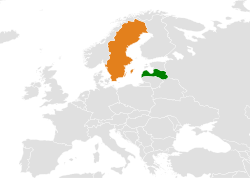
Latvia, officially the Republic of Latvia, is a country in the Baltic region of Northern Europe. It is one of the three Baltic states, along with Estonia to the north and Lithuania to the south. It borders Russia to the east, Belarus to the southeast, and shares a maritime border with Sweden to the west. Latvia covers an area of 64,589 km2 (24,938 sq mi), with a population of 1.9 million. The country has a temperate seasonal climate. Its capital and largest city is Riga. Latvians belong to the ethnolinguistic group of the Balts and speak Latvian, one of the only two surviving Baltic languages, a branch of the Indo-European language family. Russians are the most prominent minority in the country, at almost a quarter of the population.

The Latvian National Armed Forces, or NBS, are the armed forces of Latvia. Latvia's defense concept is based on a mobile professional rapid response force and reserve segment that can be called upon relatively fast for mobilization should the need arise. The National Armed Forces consists of Land Forces, Naval Forces, Air Force and National Guard. Its main tasks are to protect the territory of the State; participate in international military operations; and to prevent threats to national security.

Arturs Krišjānis Kariņš is an American-Latvian politician who served as the prime minister of Latvia from 2019 until 2023. A linguist and businessman by profession, he previously served as Latvia's minister of Economics and a Member of the European Parliament. Born in Wilmington, Delaware, United States, to parents who had left Latvia during the Soviet occupation, he was active in the American Latvian community throughout his youth.

Pasažieru vilciens is the only passenger-carrying railway company in Latvia, operating both electric and diesel trains on various lines throughout the country. It was formed in November 2001 by bringing together two separate companies, PPU Elektrovilciens and PPU Dīzeļvilciens under one name, creating the first subsidiary of Latvian Railways. As of October 2008 JSC "Pasažieru vilciens" is an independent state-owned company. As of 2017, the company employed 1,075 people.
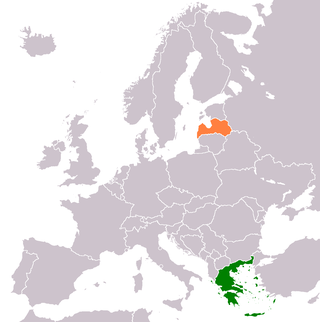
Greek-Latvian relations are the bilateral relations between Greece and Latvia. Both countries are full members of the Organization for Security and Co-operation in Europe, of NATO and the European Union. The Latvian embassy in Athens was established in 1998. Latvia also has two honorary consulates in Piraeus and in Thessaloniki. The Greek embassy in Riga was opened in January 2005.

Canadian-Estonian relations are foreign relations between Canada and Estonia. Canada recognised Estonia in 1922 and re-recognised Estonia on August 26, 1991. Canada is represented in Estonia through its embassy in Riga (Latvia) and an honorary consulate in Tallinn. Estonia has an embassy in Ottawa and 4 honorary consulates. There are around 22,000 Canadians of Estonian descent. The two countries are part of the NATO military alliance.
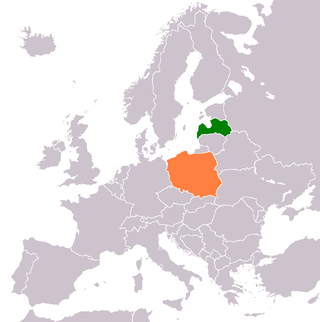
Latvia–Poland relations are foreign relations between Latvia and Poland. Both countries enjoy good relations and are close allies. There are around 57,000 Poles living in Latvia.

Currently, Belarus has an embassy in Riga, while Latvia has an embassy in Minsk. The countries share 161 km as it relates to their common border. In May 2021 the relations were de facto terminated as both countries were expelling each other's diplomats of the corresponding embassy, Latvia was insisting to use an inaccurate opposition flag as a representation for Belarus in the Ice Hockey World Championship in Riga over the Ryanair Flight 4978 diplomatic row. Belarusian Foreign Minister Vladimir Makei called Latvia's move 'an act of international vandalism' and called for an apology and return the legal green, red and white flag to its original place. The Belarusian government reacted with expelling every Latvian diplomat including the Ambassador inside the country, with Latvia following with the same response. The Zurich-based International Ice Hockey Federation sided with Belarus and asked the mayor of Riga to urgently take down the IIHF flags to protest to what the body called a political gesture.
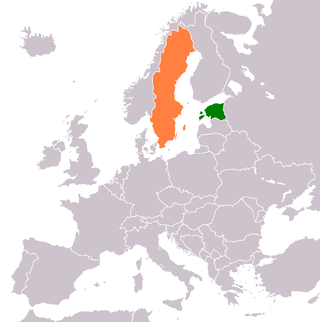
Estonia–Sweden relations are foreign relations between Estonia and Sweden.
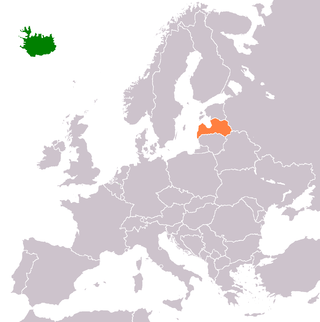
Iceland–Latvia relations are foreign relations between Iceland and Latvia. Iceland was the first country to recognize the independence of Latvia in August 1991. Both countries re-established diplomatic relations on August 22, 1991. Neither country has a resident ambassador. Iceland is represented in Latvia through its embassy in Helsinki (Finland). Latvia is represented in Iceland through its embassy in Oslo (Norway) and an honorary consulate in Reykjavík.
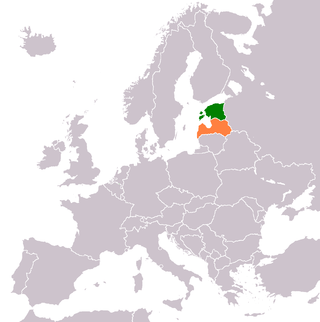
Estonia and Latvia, the two northernmost Baltic states, share 343 km of common borders and a long common history, having since the 13th century been ruled by the Livonian Order, Poland–Lithuania, Sweden and finally, until achieving independence in 1918, the Russian Empire. They were both re-occupied by the USSR between 1945 and 1991. The countries reestablished diplomatic relations on 3 January 1992. Estonia has an embassy in Riga, and Latvia has an embassy in Tallinn.
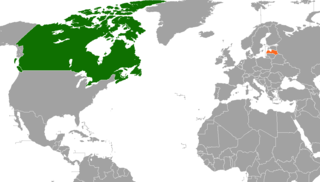
Canada–Latvia relations are foreign relations between Canada and Latvia. Canada re-recognized Latvia's independence on August 26, 1991. During the 1920s Canada helped Lithuania gain their independence with their victory in the war over the Baltics in Lithuania.
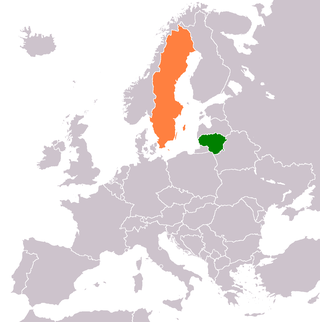
Lithuania–Sweden relations are the foreign relations between Sweden and Lithuania. Sweden has an embassy in Vilnius. Lithuania has an embassy in Stockholm.
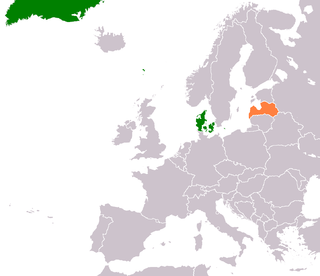
Denmark–Latvia relations refers to the historical and current diplomatic relations between Denmark and Latvia. Denmark has an embassy in Riga and Latvia has an embassy in Copenhagen.
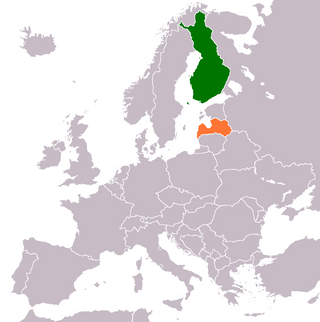
Finland–Latvia relations are foreign relations between Finland and Latvia. Finland has an embassy in Riga. Latvia has an embassy in Helsinki. Both countries are full members of the Council of Europe, the Council of the Baltic Sea States, the European Union, NATO, and the Eurozone.

The New Unity is a centre-right political alliance in Latvia. Its members are Unity and four other regional parties, and it is orientated towards liberal-conservatism and liberalism.

Egils Levits is a Latvian politician, lawyer, political scientist and jurist who served as the tenth president of Latvia from 2019 to 2023. He was a member of the European Court of Justice from 2004 to 2019.
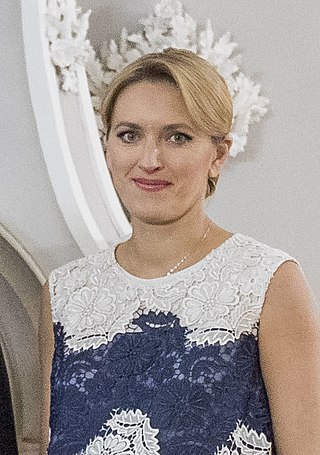
Ieva Ilvesa is a Latvian diplomat, politician and cyber security policy expert, and former First Lady of Estonia. Ilvesa ran as a Latvian candidate for the 2019 European Parliament election. She was the third place candidate for Development/For!, second on the list was Baiba Rubesa, the former CEO of Rail Baltica.

Ojārs Ēriks Kalniņš was a Latvian politician and diplomat who served as a member of the Saeima (2010–2021), head of the Latvian Institute (1999–2010), and as Ambassador to the United States (1993–1999). Born in a displaced person's camp in Germany to parents escaping the Soviet occupation of Latvia, he spent his early career working for various Latvian-American organizations before moving to Latvia and taking part in the restoration of Latvian independence. In 1998, he was awarded the Order of the Three Stars.

Kaspars Briškens is a Latvian politician, economist, and a former diplomat. In the 2022 parliamentary election, Kaspars Briškens is a candidate for the post of prime minister of the Progressives party.
